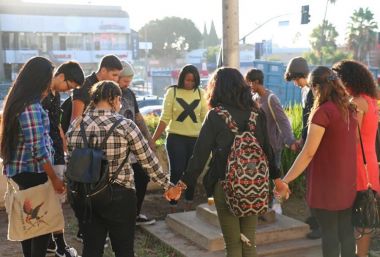How to deal with confrontation in the Church
Confrontation. It's not many people's favourite thing. We often go to great lengths to avoid it, and as Christians, we have the perfect excuse to do just that: we're the body of Christ – redeemed by grace and called to love our neighbour and be merciful.
And yet we know all too well it's not as simple as that.

While it's true that we have been redeemed and set apart by God as his Bride, it is also true that we remain human. We make mistakes. We offend one another. We argue. We sin.
Our fellow believers are our brothers and sisters and we are called to love them. But depending on our character – and perhaps our denomination – what it looks like to love a brother or sister when conflict arises may look a little different.
For a long time I fell into the trap of thinking that the best way I could love my friends was not to challenge them when I saw them going off track. To love them and stand by them. God had grace for me, so I could have grace for them.
It took a while to realise that this inaction – while coming from a place of love – wasn't actually loving. My desire to love them and stand by them was actually robbing them of a challenging voice. I was not holding my friends to account. By averting my eyes, in the name of grace, I was condoning them doing things that weren't good for them.
As Tim Keller, says: "Love without truth is sentimentality; it supports and affirms us but keeps us in denial about our flaws."
Although we might be tempted to ignore sin for the sake of love, accepting people as they are in an attempt to be inclusive, Jesus seems to suggest another way.
His model for confronting sin is laid out in Matthew 18.15-17:
"If your brother or sister sins, go and point out their fault, just between the two of you. If they listen to you, you have won them over. But if they will not listen, take one or two others along, so that 'every matter may be established by the testimony of two or three witnesses.' If they still refuse to listen, tell it to the church; and if they refuse to listen even to the church, treat them as you would a pagan or a tax collector."
I don't know about you, but on first reading, this passage strikes fear into my all-I-want-to-do-is-be-nice-to-people heart.
We can get behind the idea of confronting someone one-on-one, even if it's not a skill that comes naturally to many of us. It also makes sense to get a couple of people together to talk to the person, if you think the issue is a serious one. Where things get a bit more uncomfortable is when Jesus suggests telling the whole church and if they don't listen, treating them like an outcast!
This conjures up images of domineering church leaders shaming members of their congregations into complying with their particular doctrine of faith, and creating a culture of fear and exclusivity.
But that doesn't sound like something Jesus would support, let alone suggest.
Thankfully, it's not at all what the all-loving merciful Son of God is suggesting as the best way of confronting sin and conflict in church.
Jesus' teaching presupposes three things that are crucial to our understanding of these verses:
1. A basis of love
Jesus presupposes that any action taken comes from a place of love. Challenging a friend out of your genuine love for them is very different to trying to control them out of fear.
2. A particular model of Church
The word church in the Bible comes from the Greek ekklesia, which means a called out company or assembly. Wherever it is used in the Bible it refers to people; a local community who gather together regularly.
So when we read 'church' in Matthew 18:17, we should imagine a real community rather than a gathering of hundreds of people – think of it as a small group setting, not a big, theatre-filling Sunday service. Jesus is again saying that a person should be challenged only by those who love and know them.
3. How to treat a pagan or tax-collector
Although the cultural norm would have been to treat a pagan or a tax-collector as an outcast, Jesus models a radically alternative way – he loves them and eats with them. Matthew's Gospel ends with Jesus commissioning the disciples to reach the Gentiles. Surely, when he says treat someone like a pagan or a tax-collector, Jesus means, "Go to the ends of the earth to win him back into a life of discipleship."
Just as love without truth is sentimentality, Keller writes that "Truth without love is harshness." Our actions toward those we see sinning can come from no other place than love, knowing that we, too, are saved only by grace. We are not to treat them harshly to teach them a lesson, but Jesus does ask us to stand for truth, in love – just as he does for us.
Keller puts it succinctly once again: "God's saving love in Christ... is marked by both radical truthfulness about who we are and yet also radical, unconditional commitment to us. The merciful commitment strengthens us to see the truth about ourselves and repent. The conviction and repentance moves us to cling to and rest in God's mercy and grace."











